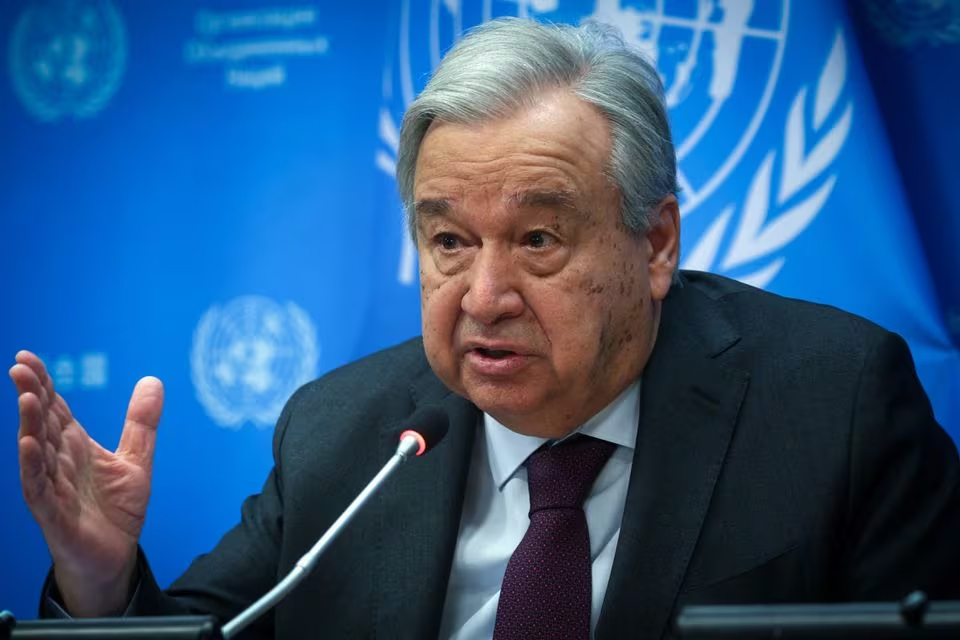UN chief Antonio Guterres deplores ‘paralysis and deadlock’ at global disarmament body
By R. Anil Kumar
-
United Nations Secretary General Antonio Guterres speaks during a press conference at U.N. headquarters in NewYork City
-
Secretary-General Urges Conference on Disarmament to Move Humanity Closer to Peace
UNITED NATIONS, GENEVA, February 26. United Nations Secretary General Antonio Guterres told the world’s top disarmament negotiating body on February 26, that it needed to make urgent reforms, accusing it of “paralysis” and failing to compel countries to cut weapons stockpiles.

Addressing the Conference on Disarmament in Geneva, Guterres said its failure to fulfil its mandate had created an atmosphere of cynicism over the value of trying to reach multilateral disarmament deals.
There was no immediate reaction from the Conference which, according to its website, focuses on negotiating deals to end the nuclear arms race and stop countries building up weapons in space, on top of pursuing general disarmament.
“Something looks wrong if a disarmament conference leads to no meaningful disarmament, year after year,” Guterres said.
“The paralysis and deadlock that have come to define it is something that is not acceptable. This Conference must be reformed urgently,” he added.
He did not mention specific negotiating efforts or give further details on what kind of reforms were needed.
The Conference was established in 1979 and is overseen by the United Nations Office for Disarmament Affairs (UNODA). It has 65 member states, including the United States, China and Russia.
It has negotiated several multilateral arms control agreements, including the Chemical Weapons Convention (CWC) that came into force in 1997 to prohibit the use and stockpiling of chemical weapons.
“From the start, this Conference and its predecessors were supposed to be the antidote to the poison of division and diplomatic paralysis that blocked meaningful disarmament,” Guterres said.
“For some time now, this Conference has not been able to function as intended. In fact, this Conference is failing in relation to its very objectives.”
Following are UN Secretary-General António Guterres’ remarks to the Conference on Disarmament in Geneva
This Conference and the bodies that preceded it took shape at a time of maximum global division — the cold war. A moment in human history when, for the first time, we faced the possibility of total annihilation.
For many years, these bodies played an essential role in drafting the agreements that form the backbone of the global disarmament agenda: The Treaty on the Non-Proliferation of Nuclear Weapons; The Conventions on Biological and Chemical Weapons; and the Comprehensive Nuclear-Test-Ban Treaty.
These victories for peace were hard-fought and hard-won. But they were not miracles. They happened because countries recognized that the key to disarmament could be found in cooperation for mutual benefit — not competition for mutual destruction.
But we need to face facts. For some time now, this Conference has not been able to function as intended. In fact, this Conference is failing in relation to its very objectives. And this failure is happening as global trust is falling apart, and because of this.
Geopolitical divides, relentless arms competition, and the erosion of frameworks have created a total deadlock. We’re witnessing the proliferation of illicit small arms and light weapons, and the use of explosive devices in populated areas.
Militaries are developing terrifying new applications of new and emerging technologies — including artificial intelligence and autonomous weapons systems. An arms race in outer space has moved from speculation to real possibility — a prospect with potentially catastrophic consequences.
And the nuclear shadow that loomed over humanity last century has returned with a vengeance. The nuclear risk is higher than at any moment since the depths of the cold war.
Some statesmen regularly imply that they are fully prepared to unleash nuclear hell — an outrageous threat that the world must condemn with clarity and force. And the vital norms and standards against the proliferation, testing and use of nuclear weapons are being eroded.
In fact, the frustration of a majority of States at the slow pace of disarmament led to the negotiation of the Treaty on the Prohibition of Nuclear Weapons.
I repeat my call to accelerate the implementation of all nuclear disarmament commitments, including under the Treaty on the Non-Proliferation of Nuclear Weapons, and to bring the Comprehensive Nuclear-Test-Ban Treaty into force. The world must no longer be held hostage by these devices of death, Guterres said.
The great tragedy is that in the middle of these crises, the failure of this Conference to reach its objectives as intended has contributed to a growing sense of cynicism about multilateral solutions. Indeed, something looks wrong if a disarmament conference leads to no meaningful disarmament, year after year.
Humanity needs the Conference on Disarmament to work successfully. The paralysis and deadlock that have come to define it is something that is not acceptable. The Conference must be reformed — urgently. And this is one of several areas of work under the proposed New Agenda for Peace.
The Agenda places the tools of prevention and disarmament at the heart of the global peace and security architecture.
It includes new strategies and approaches to deal with the nuclear, chemical, biological and autonomous weapons systems that threaten our future.
It recognizes the risks in our technology-driven, digital world, where it is all too easy to weaponize new domains against one another.
And it calls for reforming the UN bodies and institutions that underpin the global peace, security and disarmament regimes — from the United Nations Security Council to this very Conference.
We are calling for a new intergovernmental process, under the General Assembly, to develop reforms to disarmament bodies, including the Conference. We hope this could lead to a fourth special session of the General Assembly devoted to disarmament.
And I look forward to this September’s Summit of the Future, when Member States will table their ideas and solutions on the future of our peace efforts and institutions — including this Conference.
To all the members of this Conference, I urge you: Don’t contribute to the cynicism around multilateral action. Contribute to solutions that actually move us closer to a peaceful world.
Despite the current diplomatic deadlock, the central premise behind this Conference remains as vital as ever. The most effective disarmament tool is inclusive diplomacy. We need that diplomacy now — urgently. And you have the power to deliver it and change this Organization for the better.
The United Nations will continue doing everything we can to support this process of reform and change. So let’s get to work. Let’s deliver a revitalized Conference on Disarmament that can play a constructive part in building a more peaceful, stable world, the UN Secretary General urged.





